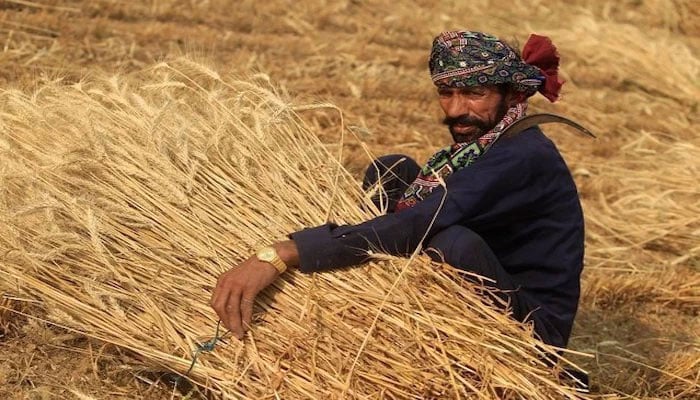Sindh growers fear low wheat output sans DAP subsidy
KARACHI: With wheat cultivation season only a few weeks away, growers in Sindh fear that the absence of a DAP subsidy mechanism might result in lower crop output and adverse impact on their incomes.
The subsidy of Rs1,000 per bag on DAP, phosphorus, and potassium fertilisers has been in limbo since last year’s announcement of a special Rabi package by the federal government. While the subsidy on phosphates was subsequently increased to Rs1,500 per acre, implementation of the relief package is still pending in Sindh as no consensus has been reached on its delivery mechanism.
On the condition of anonymity, a farmers’ association representative said, “It seems that Sindh growers are stuck in the middle of a political conflict between the federal and provincial government. How will a farmer afford DAP fertiliser when its price has increased from Rs3,950 to Rs6,500 since the start of this year due to higher imported rates?”
Without the subsidy programme, which has already been launched in Punjab, growers will find it difficult to meet their production goals. “The situation has gotten worse as the rupee has significantly weakened against the US dollar to make these DAP imports costlier,” the grower added.
In July this year, the then Provincial Minister for Agriculture Muhammad Ismail Rahoo had announced that the Sindh government would provide Rs3 billion in subsidies on DAP, fertilisers, and feed to small farmers through the “Peoples Hari (peasant) Card”. The Sindh agriculture department was targeting to register one million growers under the scheme.
Meanwhile, since the launch of Kissan Cards, the Punjab Agriculture Department has been closely engaging with stakeholders, including the fertiliser industry, to apprise them about the disbursed subsidies and steps underway to further expand the Kissan Card scheme.
In the last meeting held on August 11, 2021, the participants were informed that more than Rs5 billion were already disbursed in subsidies on DAP, phosphorus, and potassium fertilisers. The fertiliser industry has requested the department for support to expand coverage of point of sales machines, while the agriculture department has requested industry support to monitor the conduct of dealers to ensure efficiency and transparency for subsidy disbursement mechanism.
Last year, the country recorded 27.5 million tonnes of wheat, out of which more than 4 million tonnes were produced in Sindh, as it surpassed the wheat acreage target. Despite this bumper output, the government has decided to import up to 4 million tonnes of wheat at record high prices.
Owing to higher domestic consumption and growers' concerns about crop yields without any effective DAP subsidy mechanism, these imports aimed at building strategic reserves to overcome any food shortages.
-
 'A Very Special Visitor' Meets Queen Camilla At Clarence House
'A Very Special Visitor' Meets Queen Camilla At Clarence House -
 Jodie Turner Smith Shares One Strict Rule She Follows As A Mom
Jodie Turner Smith Shares One Strict Rule She Follows As A Mom -
 Hailey Bieber Reveals KEY To Balancing Motherhood With Career
Hailey Bieber Reveals KEY To Balancing Motherhood With Career -
 Photo Of Jay-Z, Other Prominent Figures With Jeffrey Epstein Proven To Be Fake
Photo Of Jay-Z, Other Prominent Figures With Jeffrey Epstein Proven To Be Fake -
 Hillary Clinton's Munich Train Video Sparks Conspiracy Theories
Hillary Clinton's Munich Train Video Sparks Conspiracy Theories -
 Fans Slam Talk Show Host For 'cringe' Behavior In Chris Hemsworth Interview
Fans Slam Talk Show Host For 'cringe' Behavior In Chris Hemsworth Interview -
 Woman Jailed Over False 'crime In Space' Claim Against NASA Astronaut
Woman Jailed Over False 'crime In Space' Claim Against NASA Astronaut -
 James Van Der Beek’s Close Pal Reveals Family's Dire Need Of Donations
James Van Der Beek’s Close Pal Reveals Family's Dire Need Of Donations -
 Prince William And Harry's Cousins Attend 'Wuthering Heights' Event
Prince William And Harry's Cousins Attend 'Wuthering Heights' Event -
 Hailey Bieber Turns Heads Just Hours After Major Business Win
Hailey Bieber Turns Heads Just Hours After Major Business Win -
 King Charles' Andrew Decision Labelled 'long Overdue'
King Charles' Andrew Decision Labelled 'long Overdue' -
 Timothee Chalamet 'forever Indebted' To Fan Over Kind Gesture
Timothee Chalamet 'forever Indebted' To Fan Over Kind Gesture -
 Columbia University Sacks Staff Over Epstein Partner's ‘backdoor’ Admission
Columbia University Sacks Staff Over Epstein Partner's ‘backdoor’ Admission -
 Ozzy Osbourne's Family Struggles Behind Closed Doors
Ozzy Osbourne's Family Struggles Behind Closed Doors -
 Dua Lipa Claims Long-distance Relationship 'never Stops Being Hard'
Dua Lipa Claims Long-distance Relationship 'never Stops Being Hard' -
 BTS Moments Of Taylor Swift's 'Opalite' Music Video Unvieled: See Photos
BTS Moments Of Taylor Swift's 'Opalite' Music Video Unvieled: See Photos




